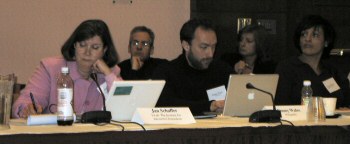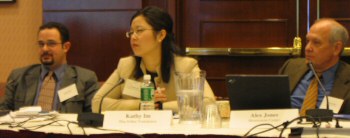[bjc] Friday morning
[Links to the participants] Conference blog aggregator IRC channel: #webcred at freenode.net]

Jan Schaffer, Jimmy Wales, Faye Anderson

jon Bonne, Kathy Im, Alex Jones
Jay Rosen leads off with a brief talk about the paper commissioned for this conference, “Bloggers cs. Journalists Is Over.” [I like the idea of conferences commissioning papers. Also maybe next time: music.] He sees the paper as a “peace-making” document that’s also “trouble-making.” Peace: The war and the cartoon dialogue should be over. It doesn’t mean that the discussion is over. The tension is inevitable. But look at how independent citizens were able to contribute to the tsunami story.
Jay says there’s a powershift from producers to “consumers.” This has led to a loss of sovereignty, a loss of exclusive control. As Rebecca Blood says, blogging and journalism exist in a shared media space. [I actually don’t think blogging is a type of medium. [Note: In the comments to this post, Rebecca Blood clarifies and corrects my statement. Thanks and sorry, Rebecca!] The people pushing it forward are in general not the professional journalists but people on the Web. He says the majority of readers of the NY Times read it on line, but the reporters at the NY Times generally feel they’re writing for a traditional paper that happens to have an online supplement.
Dave Winer responds. He says what’s great about Jay is that he came from the world of ink and really understood what we’re doing. It’s not about blogging replacing and destroying journalism. It’s really hard to find the boundaries. One way to get there would be for the journalists to look at some of the practices of blogging. E.g., full transcripts of every interview.
Bob giles of the Nierman Foundation says he’s never thought about it as adversarial. Corporate news organizations ingest ideas very slowly. Ed Cone is doing very interesting work in Greensboro.
Open discussion:
Jon Garfunkel responds to Jay’s points, saying (overall) that Jay gives too much credit to bloggers.
Dorothy Zinberg: What is the psychological gap? How would an ink person think differently if she were writing for a blog?
Jay: Every reader is a writer. Every reader is connected horizontally to all the other readers. In Web publishing, the editing occurs after publication.
Jeff Jarvis: Yes, there isn’t a war. At some point we won’t be able to tell the difference between journalism and citizen journalism, but now they are distinct and there’s a tensions.
Lee Rainie of the Pew Internet project says that it’s recognized now that trust and credibility are social processes: The process of deciding what to believe in and act on is a conversational process. In his research, he sees this happening in the health community where the omnipotent doctor is giving way to online support groups of various sorts.
Chris Lydon argues against the reconciliation. As Dave Winer says, bloggers are evangelists. The blogosphere is a better metaphor for God than the NY Times. “I used to think of the NY Times as God’s memo on the day.” The new metaphor is technorati: You can scan the home page and see a million bloggers…
Ed Clone: I’m a journalist and I didn’t understand blogging until I got one. He points to Greensboro101.com and the fact that there’s plenty of space for citizen journalists. “I’m a writer and reporter and I feel tremendously empowered by these tools.”
Jan Schaffer says the question is: What will news look like in the future?
Rebecca Mackinnon asks if participatory journalism will result in feedback loops where people only hear wht they want ot hear and not what they don’t want to hear?
Dan Gillmor, in response to Chris Lydon, says that the NY Times of the rich and powerful and the blogosphere is the trade journal of us and how we live our daily lives. And we need ways to track the conversations better.
Hoder (via IRC): Blogs have more credibility in closed societies.
John Hinderaker: I want to put in a good word for objectivity. I define it as neutrality, fairness, accuracy, and it should remain an important goal for people doing primary news reporting. Objectivity is never perfect; all journalists know that.
Jeff Jarvis: John, who do you think is doing a good job of it?
John: Many reporters do an excellent job. The problem with the NY Times, Washington Post and CBS is they lack diversity: Almost all the editors are liberals.
Dave W: Objectivity leads to you not disclosing your point of view and to a lack of transparency. Newspapers ought to provide a dossier of all previous articles, what school they went to, etc.
Alex Jones: Winer is onto something important. Objectivity is important to traditional journalism. Accountability and transparency may be the greatest things the blogosphere can bring to journalism. I don’t think the question of who you are is important to mainstream journalism gaining credibility, but it ought to be responsible for how they made the choices they did. The “who” issue gets in the way: A Democratic can write about a Republican. The “who” would be used mainly to discredit people.
Faye Anderson: Bloggers are more easily transparent because we have links and more context.
Jeff: Objectivity is a sink hole. What we really want to do is be honest and tell the truth.
Me: Objectivity is a methodology and a rhetoric. (And newspapers in their objectivity also tell us what we should find interesting.) The rise of blogs tells us that we’re interested in other forms of rhetoric and are taking over the question of what we found interesting.
Me: Three possible dimensions of tension between j and b: Economics, truth and reputation.
Xiang Qiang: We should focus on the collective effect of the blogosphere.
Bill Buzenberg: We’ve created a big data of people in our audience who are willing to give us info. It’s a revolution in sourcing.
Dan: We need to expect more of what used to be alled “the audience.” They have more work to do.
David Sifry: I care a lot about objectivity, but what’s most important to me when I read the media is trust. Do I trust the person I’m listening to. Knowing that there are fact checkers and an attempt to be objective helps me to trust a newspaper. But I can lso check what the bloggers are saying and watch what they do over time and what other people are saying about them…that gives me a huge amount of info about whether I can trust them. And that’s were the common ground is.
Jane Singer: How do we get people to go read people they don’t agree with?
Susan Tifft: The younger generation generally doesn’t know what blogs are and is confused about what journalism is.
Jeff: More voices are good and we link to lots of voices.
Lee: Our research shows that the most fervent information seekers (about 15-20% of the general population of adult Americans) are aware of many more political arguments than those who do not. They are not only going to sites that reinforce their views.
Chris: The conflict is between the blogosphere and the media powers that be. The crisis is that we’re not well-informed. The goal of journalism is popular wisdom [= making the populace wise] and we’re in deep trouble.
Jay: Bill Buzenberg’s comment represents a big change in American journalism. The old idea is that the audience lacks knowledge and that’s why they need the journalists. Bill’s idea is really different. WRT objectivity, of course we want people to step outside their own beliefs. That’s integrity, not objectivty. We used to be able to believe that the quality of info comes from professionalism, having a strong organization, having good intentions. Now we’re realizing that it’s deeply related to the quality of your connection to the people you’re trying to inform. Without good conection, there won’t be good information. Bloggers have that connection.
Jonathan Zittrain: This conference started out with a lot of excitement and buzz. Journalism is ill right now. What’s at stake is how we frame our view of the world. We need to find ways to frame the world in less than a 1:1 ratio.
Categories: Uncategorized dw










Thanks for this, David. The conference (foolishly) chose Real Player for its stream, so I’m unable to listen in.
“As Rebecca Blood says, blogging and journalism exist in a shared media space. [I actually don’t think blogging is a type of medium.]”
Blogging and journalism exist in a shared _attention_ space.
I think that is perhaps what Ms. Blood is trying to say. I could be wrong.
“Ed Clone!” Great typo! (Or did Ed bring the Cone Clone?)
fp, hah! I’d love to clone Ed, but I’d also like to get his name right.
Someone at the conf referred to aggregators as aggrevators by mistake :)
“As Rebecca Blood says, blogging and journalism exist in a shared media space. [I actually don’t think blogging is a type of medium.] ”
I don’t think blogging is a type of medium, either. blogging a format.
the Web is the medium I’m referring to.
Thanks, Rebecca. I’m adding a pointer to your comment.